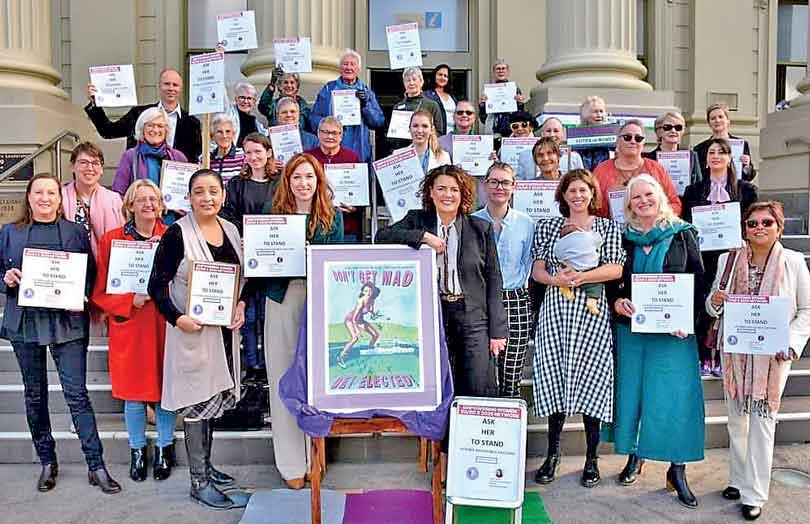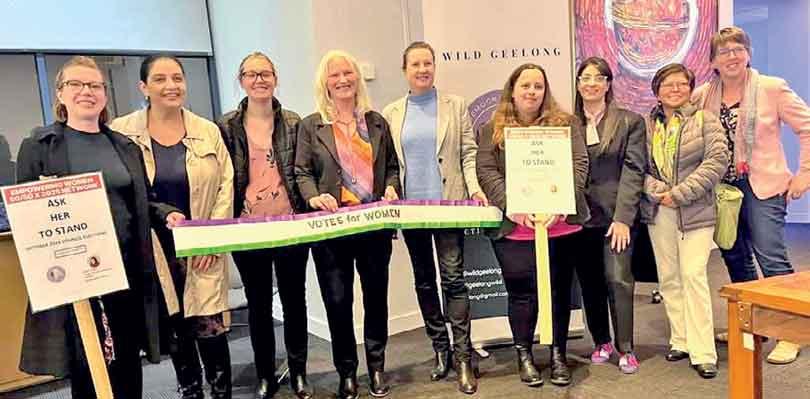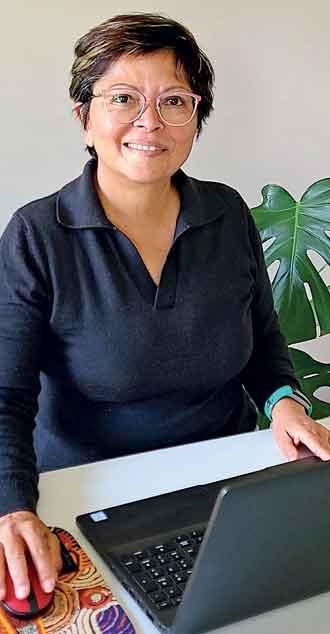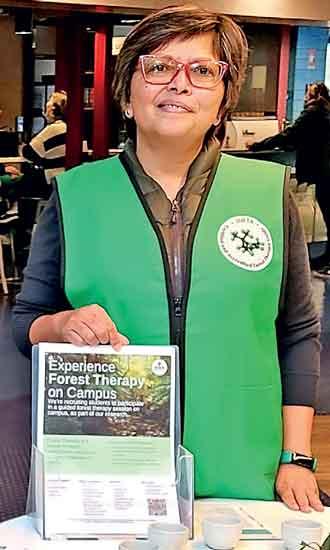Realising her political ambitions in Australia


Her passion for nature therapy propelled her to become the President of the International Nature and Forest Therapy Alliance, a role she embraces with enthusiasm
 Susan Joachim, a Sri Lankan migrant, has called Australia home for over a decade, where she has excelled in her professional endeavors. Deeply enamored with nature, Susan discovered the practice of forest bathing and was inspired to establish her own enterprise, offering immersive forest bathing experiences. Her passion for nature therapy propelled her to become the President of the International Nature and Forest Therapy Alliance, a role she embraces with enthusiasm.
Susan Joachim, a Sri Lankan migrant, has called Australia home for over a decade, where she has excelled in her professional endeavors. Deeply enamored with nature, Susan discovered the practice of forest bathing and was inspired to establish her own enterprise, offering immersive forest bathing experiences. Her passion for nature therapy propelled her to become the President of the International Nature and Forest Therapy Alliance, a role she embraces with enthusiasm.
Now, Susan is driven by a desire to address gender disparity and enhance diverse representation in the political sphere of her adopted country. She is set to contest the upcoming local elections in Geelong, bringing her unique perspective to the political arena. Susan’s journey is a testament to the power of determination, proving that with dedication, anything is possible.
 Q: What inspired your journey from Sri Lanka to Australia, and how has your immigrant experience shaped your political ambitions?
Q: What inspired your journey from Sri Lanka to Australia, and how has your immigrant experience shaped your political ambitions?
The migrant journey is often deeply influenced by both the political situation at home and the opportunities abroad. In my case, Sri Lanka’s political landscape and the economic prospects available in Australia drew me to this country. I arrived with my professional qualifications and experiences, having worked globally with leading donor and corporate organizations. Over time, I responded to the call for gender parity in local council elections and the need for diverse representation in Australia’s multicultural society. This journey has given me a unique perspective on leadership, allowing me to contribute toward a more inclusive political landscape, especially in the light of contesting for a political office as an independent candidate.
 Q: Could you tell us about your path to becoming a Forest Therapist and how this holistic practice has influenced your outlook on leadership and policy-making?
Q: Could you tell us about your path to becoming a Forest Therapist and how this holistic practice has influenced your outlook on leadership and policy-making?
Growing up in Sri Lanka, I enjoyed a carefree life in nature, which instilled in me a deep love for the environment. As I developed my career as a Forest Therapist, I became acutely aware of the climate emergency and the need to nurture environmental stewardship for future generations. This holistic practice has influenced my leadership and policy-making by grounding my approach in sustainability and a respect for nature. I encourage others to renew their relationship with the natural world in a similar way, fostering a shared responsibility for our planet’s future.
Q: What pivotal experiences in your life made you decide to enter politics?
Working for many years at USAID in Sri Lanka and helping to put a Cabinet Paper on implementing a bipartisan National Education Task Force (NETF) on the table of the President and Prime Minister of Sri Lanka were first political milestones. Sadly, the NETF proposal was rejected for petty political reasons. The result was a lost generation of young Sri Lankans who missed out on proper education with a heavy brain drain to follow.
Turning 60 this year was a significant milestone, as it made me reflect on the rich experiences I’ve had. Growing up in Sri Lanka, I benefited from free education, strong cultural values, and a deep connection to nature, despite living through 30 years of civil war. Australia offered me the opportunity to rekindle that connection, particularly through hiking and being outdoors. My work as the President of the International Nature and Forest Therapy Alliance (INFTA) has connected me with visionary leaders, particularly at the local government level, where I was inspired by women making impactful changes. Their encouragement, along with my own life experiences, motivated me to stand for local council elections, aiming to amplify women’s voices and ensure decisions are made with a focus on future generations.
Q: As an aspiring politician, what are the key issues you want to focus on, particularly within the Australian political landscape?
 As an independent candidate for the Geelong City Council, I am committed to fostering a Council that prioritizes community needs through professional governance. My focus areas include:
As an independent candidate for the Geelong City Council, I am committed to fostering a Council that prioritizes community needs through professional governance. My focus areas include:
- A balanced approach to economic and population growth while ensuring urban planning aligns with climate change mitigation and environmental sustainability. As Geelong’s population grows disproportionately fast, sustainable development is critical. I will push for policies which promote smart urban planning to ensure that future generations have access to the services and green spaces they need to thrive in.
- Improving community health and wellbeing, leveraging my extensive experience in public health advocacy.
- Securing additional funding from state and federal governments through strategic advocacy to enhance essential services such as safer roads, well-maintained footpaths, and better access to health, education, recreation, and transport services. By maintaining a visible and active role in the community, I will ensure our Council governs with transparency, accountability, and a focus on future generations.
Q: How do you plan to integrate your passion for nature and Forest Therapy into your political platform, especially with regard to environmental sustainability?
I plan to integrate my passion for nature and Forest Therapy into my political platform as an independent candidate by advocating for policies which prioritize the preservation and expansion of forests and green spaces. I promote initiatives which encourage outdoor activities and community involvement in nature, fostering a sense of environmental responsibility. Additionally, I will champion sustainable urban planning that integrates natural landscapes, reduces carbon footprints, and promotes biodiversity, all while considering the mental health and wellbeing benefits of connecting with nature.
As an independent candidate for the Geelong City Council, I am committed to fostering a Council that prioritizes community needs through professional governance
Q:What policies would you propose to address climate change and promote sustainable living in urban and rural communities?
My climate policies would focus on:
- Promoting renewable energy initiatives and energy-efficient building practices.
- Expanding public green spaces and enhancing biodiversity through tree planting and conservation efforts.
- Encouraging sustainable transport solutions, including improved public transport systems and bike-friendly infrastructure.
- Implementing community-based education programmes to raise awareness of sustainable practices, both in urban and rural areas. Education is key to fostering sustainable living practices, and I would advocate for schools and community programmes which focus on climate literacy, sustainability, and environmental responsibility. This will equip future generations with the skills they need to address these and coming challenges, ensuring a long-term investment in sustainable living.
Q:How do you envision engaging with diverse communities to ensure they are represented in your political work?
I envision engaging with diverse communities through active outreach and consultation, ensuring that all voices are heard and represented. I would establish regular community forums and open dialogue sessions where people from different cultural backgrounds can share their concerns and aspirations. Collaborating with community leaders and multicultural organizations will also be essential to building trust and fostering inclusivity. My goal is to create policies that reflect the diverse needs and values of all communities within our ward.
Q: In what ways can politicians lead by example when it comes to mental health and wellbeing?
Politicians can lead by example in mental health and wellbeing by being open about their own mental health journeys, practicing self-care, and promoting a healthy work-life balance. Advocating for policies which support accessible mental health services and creating environments where mental health is prioritized in both public and private sectors is key. A holistic approach to health, encompassing both mental and physical wellbeing, is essential. By promoting green spaces and nature-based therapies, we can complement traditional health services and provide the community with a more comprehensive support system. I believe in leading with empathy, demonstrating the importance of community wellbeing, and encouraging wellness practices such as mindfulness and nature-based therapy.
Q:What are the unique challenges you’ve faced as an immigrant in Australia, and how do you think these experiences will benefit your political career?
As an immigrant, one of the most significant challenges has been understanding the culture of my new home, finding acceptance, and building new friendships. However, I’ve come to embrace the Australian values of hard work and mateship. The opportunities are there for those who are willing to integrate and contribute to society. My experiences have given me a deep appreciation for the importance of acceptance, tolerance, and diversity—values I bring to my political career.
Q: What message do you have for young immigrants and aspiring politicians who may look up to your journey?
To young immigrants and aspiring politicians, my message is simple: there is nothing to stop you from achieving your dreams. Australia offers many opportunities for those who are willing to work hard and embrace the values of mateship and community. There are resources available to help you settle, and I encourage you to take advantage of them. Don’t be afraid to make yourself known, share your culture, and build connections. The path may not always be easy, but your experiences and perspective are invaluable, and you can make a difference. Just look at Barack Obama and Kamala Harris—their journey is a testament to what is possible.
Pix courtesy SJ


 Susan Joachim, a Sri Lankan migrant, has called Australia home for over a decade, where she has excelled in her professional endeavors. Deeply enamored with nature, Susan discovered the practice of forest bathing and was inspired to establish her own enterprise, offering immersive forest bathing experiences. Her passion for nature therapy propelled her to become the President of the International Nature and Forest Therapy Alliance, a role she embraces with enthusiasm.
Susan Joachim, a Sri Lankan migrant, has called Australia home for over a decade, where she has excelled in her professional endeavors. Deeply enamored with nature, Susan discovered the practice of forest bathing and was inspired to establish her own enterprise, offering immersive forest bathing experiences. Her passion for nature therapy propelled her to become the President of the International Nature and Forest Therapy Alliance, a role she embraces with enthusiasm. Q: What inspired your journey from Sri Lanka to Australia, and how has your immigrant experience shaped your political ambitions?
Q: What inspired your journey from Sri Lanka to Australia, and how has your immigrant experience shaped your political ambitions? Q: Could you tell us about your path to becoming a Forest Therapist and how this holistic practice has influenced your outlook on leadership and policy-making?
Q: Could you tell us about your path to becoming a Forest Therapist and how this holistic practice has influenced your outlook on leadership and policy-making? As an independent candidate for the Geelong City Council, I am committed to fostering a Council that prioritizes community needs through professional governance. My focus areas include:
As an independent candidate for the Geelong City Council, I am committed to fostering a Council that prioritizes community needs through professional governance. My focus areas include: